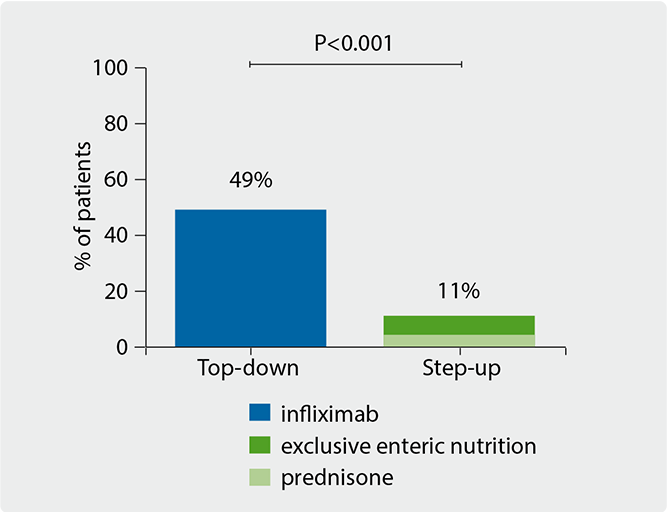https://doi.org/10.55788/fd6977a2
The prospective, randomised, controlled trial, presented by Dr Ingo Steinbrück (Evangelisches Diakoniekrankenhaus Freiburg, Germany), enrolled 394 participants with non-pedunculated colorectal polyps measuring 20 mm or more [1]. This study primarily focused on major complications such as perforation or clinically significant post-endoscopic bleeding.
The results of this intention-to-treat analysis showed that the CS-EMR group had a significantly lower rate of major complications at 1% compared with the 8% observed in the HS-EMR group (P=0.001). These included a lower incidence of perforation (0% vs 4%; P=0.007) and post-endoscopic bleeding in the CS-EMR group (1% vs 4.5%; P=0.038).
In addition to these primary findings, the study also shed light on various secondary outcomes. For instance, the CS-EMR group exhibited a lower intraprocedural bleeding rate than the HS-EMR group (14% vs 22.9%; P=0.023). Still, the technical success rate was slightly lower in the CS-EMR group than in the HS-EMR group (92.2% vs 97.5%; P=0.017).
Dr Steinbrück concluded: "CS-EMR is superior in safety to HS-EMR, almost eliminating major adverse events. However, it presents a higher rate of residual neoplasia, necessitating careful lesion selection to mitigate recurrence risks.” Further analysis is required to identify the most suitable lesions for CS-EMR and to explore technical and procedural enhancements that could bolster its effectiveness.
- Steinbrück I, et al. Cold vs. hot snare resection of non-pedunculated polyps ≥2cm in the colorectum – first results from the prospective, randomized, controlled, multicentric CHRONICLE trial. LB06, UEG Week 2023, 14–17 October, Copenhagen, Denmark.
Copyright ©2023 Medicom Medical Publishers
Posted on
Previous Article
« Higher recurrence rates with cold snare EMR than with conventional EMR Next Article
Subcutaneous infliximab shows promise in UK IBD study »
« Higher recurrence rates with cold snare EMR than with conventional EMR Next Article
Subcutaneous infliximab shows promise in UK IBD study »
Table of Contents: UEGW 2023
Featured articles
SEQUENCE: Risankizumab doubles endoscopic remission rates compared with ustekinumab in CD
What’s New in Artificial Intelligence
Digital intervention relieves symptoms and improves QoL in IBS
GastroGPT: Successful proof-of-concept study of gastroenterology-specific large language model
Other Therapeutics and Outcomes
Primary results from MAESTRO-NASH trial: resmetirom efficacious for NASH
Apraglutide: Advancing the treatment of short bowel syndrome
Endobiliary radiofrequency ablation in pCCA: a pilot study
Raising awareness for microscopic colitis: disease course and predictors
Outcomes of IBD Trials
DIVERSITY1: Filgotinib results in Crohn’s disease leave investigators puzzled
SEQUENCE: Risankizumab doubles endoscopic remission rates compared with ustekinumab in CD
Guselkumab provides benefits in UC regardless of advanced therapy history
INSPIRE: Risankizumab meets all efficacy endpoints in UC
Risankizumab resolves extraintestinal manifestations in CD
Obefazimod takes the spotlight as promising UC treatment
Rapid response to upadacitinib boosts outcomes in severe Crohn’s disease
LUCENT trials: Mirikizumab works in UC, regardless of targeted therapy history
ARTEMIS-UC: New kid in town for UC
Breakthroughs in Colorectal Lesions
Safer removal of large polyps with cold snare technique
Higher recurrence rates with cold snare EMR than with conventional EMR
How to deal with at-risk patients above the CRC screening age limit?
European CRC screening needs to be revised
Advances in Upper Endoscopy and Colonoscopy
Epinephrine boosts efficiency in gastric ESD
Artificial intelligence-aided colonoscopy did not improve outcomes in Lynch syndrome
Can computer technology improve our everyday colonoscopy results?
Is AI-assisted colonoscopy ready for clinical practice?
Should we use E-SEMS or EVT for traumatic oesophageal perforations?
Related Articles

March 8, 2022
ECCO 2022 Highlights Podcast

October 23, 2019
Practice-changing: infliximab in children with Crohn’s
September 3, 2021
New blood test can help detect early stomach cancer
© 2024 Medicom Medical Publishers. All rights reserved. Terms and Conditions | Privacy Policy
HEAD OFFICE
Laarderhoogtweg 25
1101 EB Amsterdam
The Netherlands
T: +31 85 4012 560
E: publishers@medicom-publishers.com

